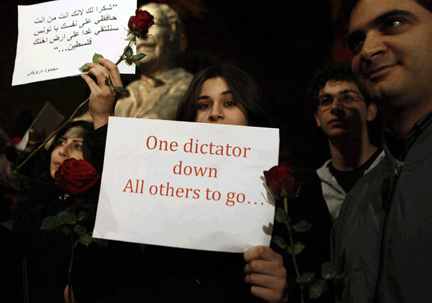
The recent revolution in Tunisia has exploded across the blogosphere, with pundits talking about a popular tsunami that may promote democracy out of the ashes of a lifelong dictatorship. In yesterday’s New York Times, Roger Cohen provided an optimistic view from his journalistic perch in Tunis: “These are heady days in the Arab world’s fragile democratic bridgehead.” Cohen, and others, are wondering aloud if Tunisia can become the new Turkey, a more or less secular democracy in which the “Islamists” are moderate members of a political mosaic. If so, then he warns that the “tired refrain of all the Arab despots that they are the only bulwark against the jihadists will be seen for the self-serving lie it has become.”
Perhaps, but one does not have to go far back into the regime of Saddam Hussein to realize that his Ba’athi party did not tolerate religiously motivated sectarian violence. Brutal as it was, his regime was a bulwark (if such a metaphor really makes sense politically) against the continual round in “liberated” Iraq of sunni killing shi’a and vice versa. But then Saddam was not brought down by a popular street uprising.
Not all Arab despots are as brutal as Saddam or Ben Ali; take the situation in Egypt, for example. Here is Cohen’s spin: “I can’t see President Hosni Mubarak, who’s headed that regime for three decades, facing less than upheaval if he tries to hand power to his son, Gamal, in the current environment. There’s more than a touch of ‘We’re all Tunisians now’ among misruled Arabs right now. They’re talking Tunisian domino effect.” In political forecasting one pundit’s dominoes easily turn into another’s house of cards. But the various regimes in the Middle East are less domino-like than one might assume from the current predictions about the impact of Tunisia’s relatively bloodless revolution on nearby regimes. In so many ways – politically, economically and culturally – Tunisia is not Egypt. Nor is it Yemen, where President Ali Abdullah Salih has been in power longer than Ben Ali was and who is also said to be grooming a son for succession.
I am glad not to be trained as a political scientist, nor do I feel compelled to predict what I think will happen in the aftermath of the extraordinary turn of events in Tunisia. Will a Tunisian Ataturk emerge? A Tunisian Khomeini, another Tunisian Ben Ali? No one expects Tunisia to launch a new caliphate, nor to be torn apart by sectarian violence. The giddy sense of newfound freedom of expression and movement can lead to very different kinds of eventual government. Yemen experienced this kind of giddiness when the north and south united in 1990. There was a proliferation of political parties, plenty of grass-roots political involvement and a sense that things could get better. Two decades later Yemen is thought by some to be teetering on the edge of a “failed state” (one of those imprecise terms political scientists had to invent to explain why certain theories of state formation go awry). No one knows what Tunisia will be like in another two decades. It is not up to any pundit to figure out, but for the Tunisians to work out. For that the passage of time will be the best measure.
Daniel Martin Varisco